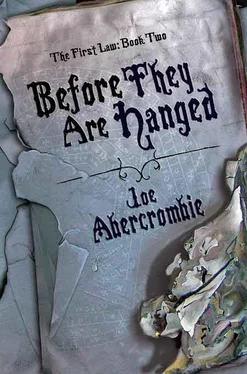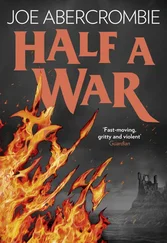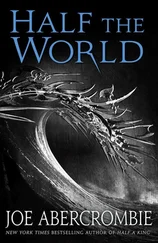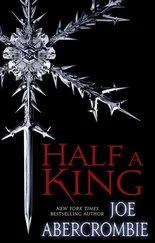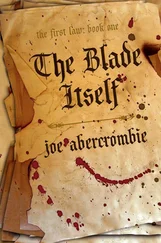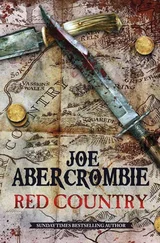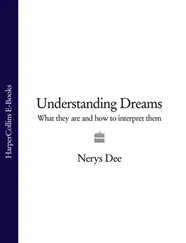“Chambers in the Citadel? While my fellows rot down here in the filth? The least a leader can do is to share the burdens of his people. I have little other comfort to give them.” It was sweltering hot down here in the Lower City, but Kahdia did not seem uncomfortable. His gaze was level, his eyes were fixed on Glokta’s, dark and cool as deep water. “Do you disapprove?”
Glokta rubbed at his aching neck. “Not in the least. Martyrdom suits you, but you’ll have to forgive me if I don’t join in.” He licked at his empty gums. “I’ve made my sacrifices.”
“Perhaps not all of them. Ask your questions.” Straight to business, then. Nothing to hide? Or nothing to lose?
“Do you know what became of my predecessor, Superior Davoust?”
“It is my earnest hope that he died in great pain.” Glokta felt his eyebrows lift. The very last thing I expected—an honest answer. Perhaps the first honest answer that I have received to that question, but hardly one that frees him from suspicion.
“In great pain, you say?”
“Very great pain. And I will shed no tears if you join him.”
Glokta smiled. “I don’t know that I can think of anyone who will, but Davoust is the matter in hand. Were your people involved in his disappearance?”
“It is possible. Davoust gave us reasons enough. There are many families missing husbands, fathers, daughters, because of his purges, his tests of loyalty, his making of examples. My people number many thousands, and I cannot watch them all. The one thing I can tell you is that I know nothing of his disappearance. When one devil falls they always send another, and here you are. My people have gained nothing.”
“Except Davoust’s silence. Perhaps he discovered that you had made a deal with the Gurkish. Perhaps joining the Union was not all your people hoped for.”
Kahdia snorted. “You know nothing. No Dagoskan would ever strike a deal with the Gurkish.”
“To an outsider, the two of you seem to have much in common.”
“To an ignorant outsider, we do. We both have dark skin, and we both pray to God, but that is the full extent of the similarity. We Dagoskans have never been a warlike people. We remained here on our peninsula, confident in the strength of our defences, while the Gurkish Empire spread like a cancer across the Kantic continent. We thought their conquests were none of our concern. That was our folly. Emissaries came to our gates, demanding that we kneel before the Gurkish Emperor, and acknowledge that the prophet Khalul speaks with the voice of God. We would do neither, and Khalul swore to destroy us. Now, it seems, he will finally succeed. All of the South will be his dominion.” And the Arch Lector will not be in the least amused.
“Who knows? Perhaps God will come to your aid.”
“God favours those who solve their own problems.”
“Perhaps we can solve some problems between us.”
“I have no interest in helping you.”
“Even if you help yourself as well? I have it in mind to issue a decree. The gates of the Upper City will be opened, your people will be allowed to come and go in their own city as they please. The Spicers will be turned out of the Great Temple, and it shall once again be your sacred ground. The Dagoskans will be permitted to carry arms; indeed, we will provide you with weapons from our own armouries. The natives will be treated like full citizens of the Union. They deserve nothing less.”
“So. So.” Kahdia clasped his hands together and sat back in his creaking chair. “Now, with the Gurkish knocking at the gates, you come to Dagoska, flaunting your little scroll as though it was the word of God, and you choose to do the right thing. You are not like all the others. You are a good man, a fair man, a just man. You expect me to believe this?”
“Honestly? I don’t care a shit what you believe, and I care about doing the right thing even less—that’s all a matter of who you ask. As for being a good man,” and Glokta curled his lip, “that ship sailed long ago, and I wasn’t even there to wave it off. I’m interested in holding Dagoska. That and nothing else.”
“And you know you cannot hold Dagoska without our help.”
“Neither one of us is a fool, Kahdia. Don’t insult me by acting like one. We can bicker with each other until the Gurkish tide sweeps over the land walls, or we can cooperate. You never know, together we might even beat them. Your people will help us dig the ditch, repair the walls, hang the gates. You will provide a thousand men to serve in the defence of the city, to begin with, and more later.”
“Will I? Will I indeed? And if, with our help, the city stands? Will our deal stand with it?”
If the city stands, I will be gone. More than likely, Vurms and the rest will be back in charge, and our deal will be dust. “If the city stands, you have my word that I will do everything possible.”
“Everything possible. Meaning nothing.” You get the idea.
“I need your help, so I’m offering you what I can. I’d offer you more, but I don’t have more. You could sulk down here in the slums with the flies for company, and wait for the Emperor to come. Perhaps the great Uthman-ul-Dosht will offer you a better deal.” Glokta looked Kahdia in the eye for a moment. “But we both know he won’t.”
The priest pursed his lips, stroked his beard, then gave a deep sigh. “They say a man lost in the desert must take such water as he is offered, no matter who it comes from. I accept your deal. Once the temple is empty we will dig your holes, and carry your stone, and wear your swords. Something is better than nothing, and, as you say, perhaps together we can even beat the Gurkish. Miracles do happen.”
“So I’ve heard,” said Glokta as he shoved on his cane and grunted his way to his feet, shirt sticking to his sweaty back. “So I’ve heard.” But I’ve never seen one.
Glokta stretched out on the cushions in his chambers, head back, mouth open, resting his aching body. The same chambers that were once occupied by my illustrious predecessor, Superior Davoust. They were a wide, airy, well-furnished set of rooms. Perhaps they once belonged to a Dagoskan Prince, or a scheming vizier, or a dusky concubine, before the natives were thrown out into the dust of the Lower City. Better by far than my poky shit-hole in the Agriont, except that Superiors of the Inquisition have been known to go missing from these rooms.
One set of windows faced northward, out towards the sea, on the steepest side of the rock, the other looked over the baking city. Both were equipped with heavy shutters. Outside it was a sheer drop over bare stone to jagged rocks and angry salt water. The door was six fingers thick, studded with iron, fitted with a heavy lock and four great bolts. Davoust was a cautious man, and with good reason, it would seem. So how could assassins have got in, and having got in, how could they remove the body?
He felt his mouth curving into a smile. How will they remove mine, when they come? Already my enemies mount up—the sneering Vurms, the punctilious Vissbruck, the merchants whose profits I threaten, the Practical who served Harker and Davoust, the natives with good reason to hate anyone who wears black, my old enemies the Gurkish, of course, and all that providing his Eminence does not get anxious at the lack of progress, and decide to have me replaced himself. Will anyone come searching for my twisted corpse, I wonder?
“Superior.”
Opening his eyes and lifting his head was a great and painful effort. Everything hurt from his exertions of the past few days. His neck clicked like a snapping twig with every movement, his back was stiff and brittle as a mirror, his leg veered between nagging agony and trembling numbness.
Читать дальше
